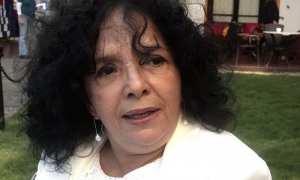Founder and director of the group Afrocuba, Minini, as everyone called him, was born in the neighborhood of Pueblo Nuevo, Matanzas one of the most important birthplaces of Afro-Cuban rumba on the island. There and among other communities around the province, he learned the secrets of both Yoruba (Batá drums) and bantú (yuca or caja, cachimbo and mula) percussion, as well as the ceremonial songs of a culture so deeply rooted in Cuban identity.
He also branched out incorporating other styles of rumba into his repertory, winning recognition as a maestro of the genre.
In 1957, Mininí founded the group Guaguancó Neopoblano, from which emerged the Afrocuba folklore music-dance collective, also created by the late musician.
First within the amateur movement, supported by the Revolution’s cultural policy, and later at a professional level, over the years Afrocuba has been consolidating its prominence as one of the top groups of its kind in the country, with high quality rumba performances, alongside that of other genres. Their role in reviving the repertories of bríkamo carabalí and gangá and incorporation of the innovative batarrumba style - a fusion of three batá drums with classic rumba instrumentals – has become one of Afrocuba’s trade marks.
Minini performed with the group on international stages across the United States, Latin America and Europe and recoded several albums, including Árboles (1985), Raíces africanas (2005) and Moquekeré Okagua: atención cubanos (2015).
Responding to the news of the musician’s death, Ulieses Mora, director of the Timbalaye project stated, “Minini was a master not only because of his performances but also the generosity with which he shared his wisdom with the new generations.”
Poet and President of the National Union of Writers and Artists of Cuba, Miguel Barnet, remembered the artist and the man, “He was a good man, very ethical. He was like a prince empowered by the dignity of his people’s culture. I shared with him in performances in and outside of Cuba. Minini will never be forgotten.”






